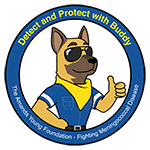Abby’s Story
On Australia Day 1998, I returned to my teaching job in a small country town in the South West of WA. I was 21, fit, healthy and at an age where you almost feel invincible. I was filled with enthusiasm about setting up my pre-primary and preparing for the year to come.
That week I noticed nothing out of the ordinary and was very busy. On the first day back at school, I woke up feeling like I had the worst flu ever. I was shivering and despite it being the middle of summer, I went to work in multiple layers of clothing. When I arrived in the staff room, people showed concern about my health but I shrugged them off. A couple of hours later the Principal insisted that I head home via the Nursing Post in town. The nurse who assisted me agreed it was probably a cold or flu and sent me home to rest. I went home, took some Panadol and went to bed. The remainder of the day was horrific! Diarrhoea and vomiting interspersed with frightening nightmares and nausea. I had to close the curtains and turn off the lights, any form of lighting made the nausea twice as bad. Although the day was a blur and I couldn’t remember ever feeling so bad I felt a bit silly calling my family a 4-hour drive away about the flu. Thankfully, at the end of the work day, the School Principal decided to check how I was going. She later told my mum, that as a mother herself, she would hope someone would do the same for her daughter if she was unwell and lived on her own – that visit saved my life!
She drove me to the nearest hospital in the neighbouring town. After an observation and increasing stomach cramps, I was incorrectly diagnosed with appendicitis and sent to the nearest hospital via ambulance. Once I arrived at the hospital, I was very stiff and a rash was developing over my torso. The nurses on duty suspected that I did not have appendicitis and when the doctor arrived, he agreed that the best course of action would be immediate antibiotics. Thankfully, my appendix remained in place! I spent the following few days under close observation in a private room in the hospital, my mum driving from Perth the following day to be with me. I continued to feel unwell during this time, having no control over my bladder and experiencing excruciating pain in my head when trying to lift it off the pillow. The results came in from my lumbar puncture a few days later and I was diagnosed with meningococcal septicaemia.
The actions of a few people in a short period of time saved my life. The Health Department cordoned off the town the following week and administered antibiotics to anyone who had been in contact with me. I am sure that this caused quite a stir in a small country town but I was unaware of all of this as I convalesced with my family in Perth for three months. This story has been difficult to write even 15 years on. Although I am thankful to have made a full recovery with only an aversion to bright lights and some memory loss, I have never recovered from the ‘Survivor Guilt’. Good people have passed away and others suffer lasting and painful side effects from meningococcal septicaemia and I wonder why I was so lucky? I am eternally grateful to the people who made the decisions that saved my life that day and my family who supported me through the recovery. I now view every day as a blessing and am appreciative for the people that make my life so special!

